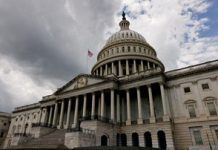The “Safeguarding Americans’ Private Records Act” was introduced by Sen. Ron Wyden and Sen. Steve Daines. In particular the bill sharply curtails the Section 215 of the Patriot Act, which gives the government broad power to ask businesses for their records relating to someone who might be involved in terrorism.
The newly-introduced bill targets the Patriot Act’s Section 215, previously used by the U.S. government to collect telephone data from millions of Americans. The bill is proposing sweeping privacy reforms to a controversial government surveillance program, which has been previously used by the National Security Agency (NSA) to vacuum up the call records of millions of Americans.
The bill closes loopholes in vague language used by Section 215 for justifying mass surveillance sans warrant. For instance, while Section 215 originally stated that the government could collect telephone data if it was deemed “relevant” to an international terrorism, the bill cracks down on that broad language by limiting the types of criminal cases that are “relevant.” It also specifies how long data that’s been collected can be retained for and includes measures for more transparency around government data collection.
“The bill ends the authority for the NSA’s massive phone record program… It prohibits the warrantless collection of cell site location and GPS information as well as browsing history and internet search history, and ensures that the government cannot conduct collection for intelligence purposes that would violate the Fourth Amendment in the criminal context,” said Wyden in his introduction to the act.
Privacy advocates have argued Section 215 allows government agencies like the NSA to justify the collection of telephone data from U.S. citizens sans warrant – particularly after the 2013 Snowden leak revealed that the government had been collecting phone records of customers from phone companies, like Verizon. Section 215 was renewed temporarily by the Obama administration in 2015 under the U.S.A. Freedom Act, but its March 15, 2020 expiration date is fast approaching – opening a door to propose reforms during the process of its renewal.








